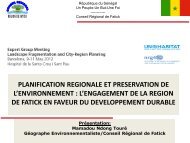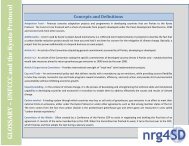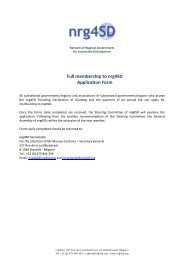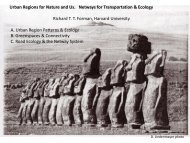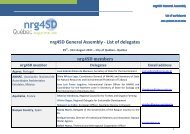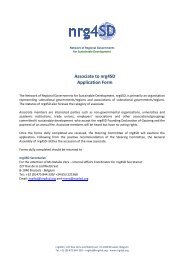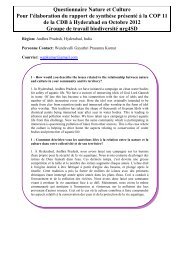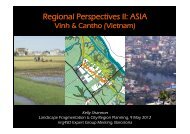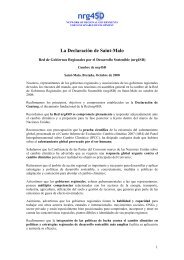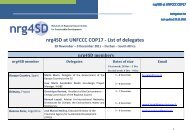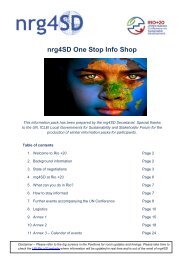Post 2015 Development Agenda: Guidelines for Country ... - nrg4SD
Post 2015 Development Agenda: Guidelines for Country ... - nrg4SD
Post 2015 Development Agenda: Guidelines for Country ... - nrg4SD
- No tags were found...
Create successful ePaper yourself
Turn your PDF publications into a flip-book with our unique Google optimized e-Paper software.
INTRODUCTION1. ContextThe adoption of the Millennium Declaration in 2000 by all 189 Member States of the UNGeneral Assembly was a defining moment <strong>for</strong> global development cooperation. In recognition ofthe need to translate this commitment into action, the Millennium <strong>Development</strong> Goals (MDGs)were adopted. Since their endorsement by the UN General Assembly, the MDGs have defined acommon framework of priorities <strong>for</strong> the development community. In September 2010, a HighLevel Plenary Meeting of the General Assembly convened to review progress on the MDG targetsand agreed on a concrete action plan to accelerate progress towards their full achievement by<strong>2015</strong>. It also called on the UN System to continue in<strong>for</strong>ming the global debate on developmentand to lead the international discussion on a post <strong>2015</strong> development agenda.The UN Secretary-General (UN SG) Report ‘Accelerating progress towards the Millennium<strong>Development</strong> Goals: options <strong>for</strong> sustained and inclusive growth and issues <strong>for</strong> advancing theUnited Nations development agenda beyond <strong>2015</strong>’ indicates that “[t]he post-<strong>2015</strong> developmentframework is likely to have the best development impact if it emerges from an inclusive, openand transparent process with multi-stakeholder participation.” 1It is critical <strong>for</strong> the UN System to launch a substantive and inclusive process that will lead to thedefinition of a beyond <strong>2015</strong> development agenda owned by all players. The UN — unlike anyother multilateral player — has the opportunity to position itself as an advocate <strong>for</strong> a bottom-upapproach defined by national and local priorities and stakeholders. As such, the organizationmust at all levels expand its ef<strong>for</strong>ts towards a more open and inclusive dialogue, that includes theviews of the poor and vulnerable, 2 to ensure global ownership of a beyond <strong>2015</strong> developmentframework.The UN SG has now initiated steps within the UN System to launch the process that will in<strong>for</strong>ma new UN development agenda. More specifically, the SG has requested UNDP and UnitedNations Department of Economic and Social Affairs (UN DESA) to establish a group of technicalexperts (<strong>Post</strong>-<strong>2015</strong> Task Team) to coordinate the assessment of system-wide ongoing ef<strong>for</strong>ts, andpropose a unified version and road map <strong>for</strong> a post-<strong>2015</strong> development agenda, in consultationwith all stakeholders. The Inter-Agency and Expert Group (IAEG) on MDG indicators, led by theUN Statistics Division (UNSD), has also set up a Task Team on Lessons Learned in MDG Monitoringto provide technical inputs specifically <strong>for</strong> monitoring, to guide the <strong>for</strong>mulation of the post-<strong>2015</strong>monitoring framework.1The report A/66/126 is available at http://www.un.org/ga/search/view_doc.asp?symbol=a/66/126.2Vulnerable groups should be well defined, based on Poverty Reduction Strategy Papers or the nationaldevelopment strategy <strong>for</strong> the country.12<strong>Post</strong>-<strong>2015</strong> <strong>Development</strong> <strong>Agenda</strong> Process: Guideline <strong>for</strong> Consultations



